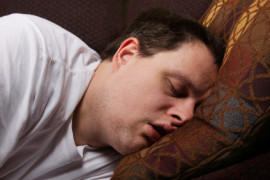Researchers have found a link between sleep deprivation and insulin resistance that might explain, at least partially, the link between sleep disorders and increased risk for diabetes. The findings were recently published in the journal Diabetologia.
The researchers studied 19 healthy young men during periods of adequate sleep (8.5 hours per night) and sleep deprivation (4.5 hours per night). They found that when the young men did not get enough sleep, they had increased levels of growth hormone and noradrenaline. The sleep deprived young men also experienced spikes in cortisol levels throughout the day.
More importantly, though, is that the young men’s insulin sensitivity was significantly reduced. This, according to the researchers, is in response to elevated circulating non-esterified (i.e. free) fatty acid concentrations, which are known to have an effect on insulin sensitivity.
The researchers concluded that sleep deprivation might contribute to insulin resistance due in part to these elevated non-esterified fatty acid concentrations.
Though this study was small, it takes an interesting view on the role of sleep in overall health. It has been widely documented that sleep disorders such as obstructive sleep apnea carry risks of comorbid diabetes, heart disease, and obesity. If lean, healthy young men can develop insulin sensitivity after a short period of sleep deprivation, it is easy to see how a chronic sleep disorder like OSA can harm an individual who is not in a state of optimal health.
An estimated 50-70 million US adults have sleep or wakefulness disorder. About 22 million of those people have sleep apnea, though only 10% receive diagnosis or treatment.
In the midst of the current diabesity epidemic, it has never been more important to address sleep disorders that may be contributing to the significant health complications and skyrocketing costs of managing diabetes.
With recent research showing that more people are candidates for oral appliance therapy than previously thought, the medical/dental team has a tremendous opportunity to screen for and treat sleep disordered breathing and change the lives of millions of individuals who may be at an increased risk of diabetes due to inadequate sleep.
Source: Sleep restriction increases free fatty acids in healthy men



